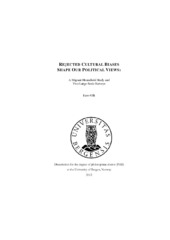Rejected Cultural Biases Shape Our Political Views: A Migrant Household Study and Two Large-Scale Surveys
Doctoral thesis
Permanent lenke
https://hdl.handle.net/1956/6103Utgivelsesdato
2012-09-28Metadata
Vis full innførselSamlinger
Sammendrag
The main research problem of how we should understand the relationship between individuals, social structures in institutions, and cultural biases is approached from two different angles: from a study of migrant households as institutions and from several surveys that focus on cultural biases at the individual level. Cultural theory, building upon the work of Mary Douglas, describes four ways of organizing, also known as ways of life or cultures—namely hierarchical, egalitarian, individualistic, and fatalistic ways of organizing. Many concepts and stereotypes emphasize the differences between the majority population and migrants. In contrast to these, the present thesis shows how migrants’ ways of organizing their households are actually familiar to us, even when these migrants come from distant countries. The author suggests that this familiarity provides a common cultural basis for communication and interaction, even between peoples who are commonly seen as being radically different. The bulk of the argument given above is based on a qualitative study consisting of in-depth interviews of seventeen migrant households presently living in Norway. The households originate from Vietnam, Chile, and Sri Lanka, and eight of them are presented in detail. They are first described according to their internal organization (based on their economic decisions, their justifications for the division of housework, and their behaviors during interviews) and their external social relations (how they justify giving and receiving support from others). Households’ stated preferences are compared with theoretically-based predictions of attitudes toward institutions, trust, social support, the distribution of resources, blame, the view of democracy, and political decision making. Contrary to the expectations of mainstream political science, this study finds a strong relationship between a household’s way of organizing and its views on society and politics. Rather than relying on the country of origin as a basis for categorization, migrant households’ relations with the state and the majority society can be better understood by knowing how they organize their households. Cultural theory is primarily a theory about institutions, but sometimes it also makes claims about people. In addition to the arguments made about migrants, this thesis also argues that people are not just miniature institutions and suggests two theoretical improvements to cultural theory. First, people do not only support one cultural bias, they can also reject or support the other cultural biases. Second, at the level of the individual, the effects of cultural biases are not additive, nor are they independent of each other; biases must be studied in combinations. Biases are better understood as a package of meanings rather than existing as separate items. In short, cultural biases are patterns of meaning that are not easy to summarize and analyze numerically, and the relevant number of biases is of course an empirical question. The argument presented here about cultural biases is based on quantitative data extracted from the 1999 Nordic Cultures Survey, which consists of representative samples from Norway, Denmark, Sweden, Finland, and Iceland (n=4833). Data are also extracted from the 1995 Norwegian Environmental Protection Survey, which consists of representative samples from 12 environmental organizations and from the general population in Norway (n=3106).
